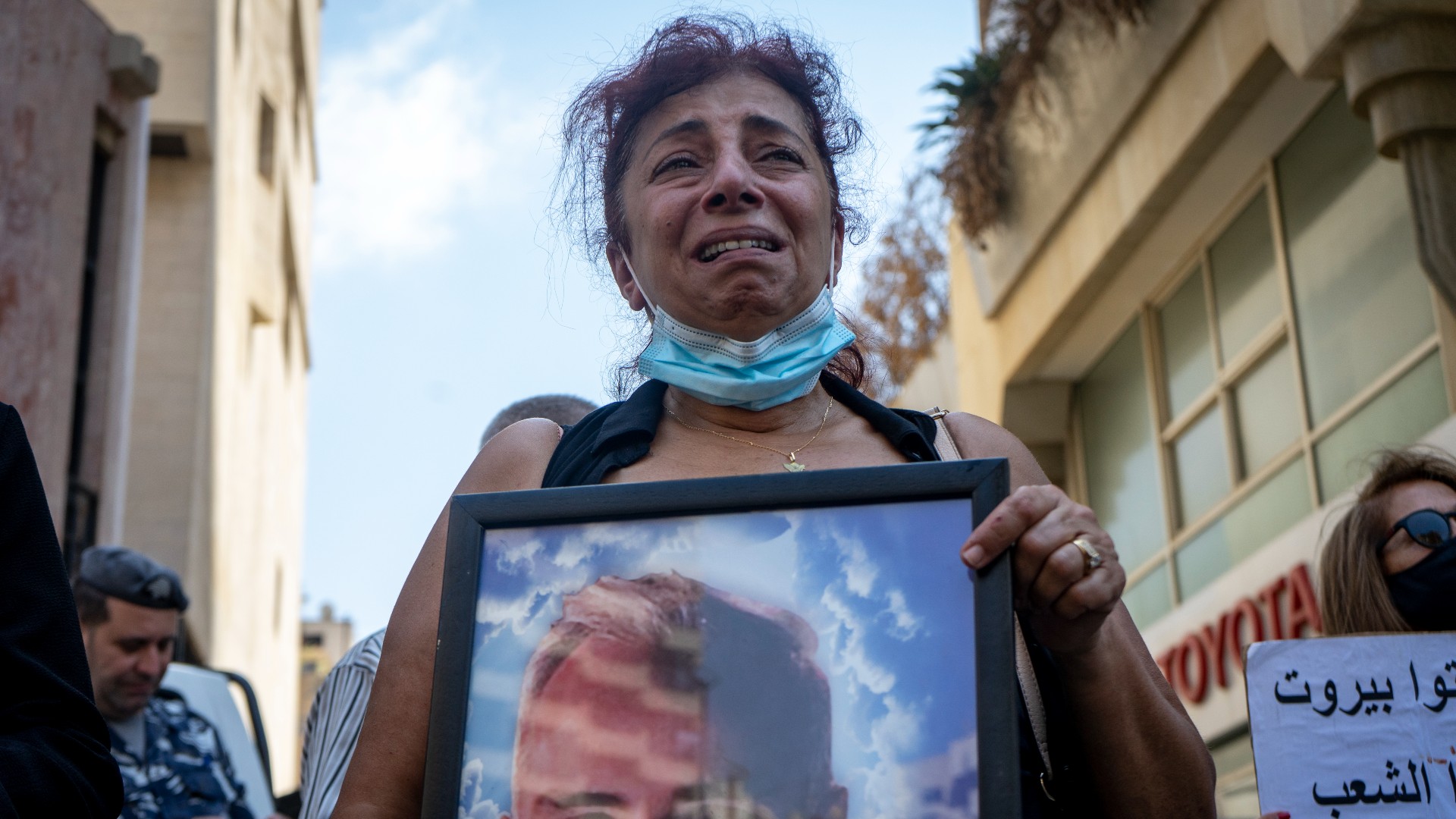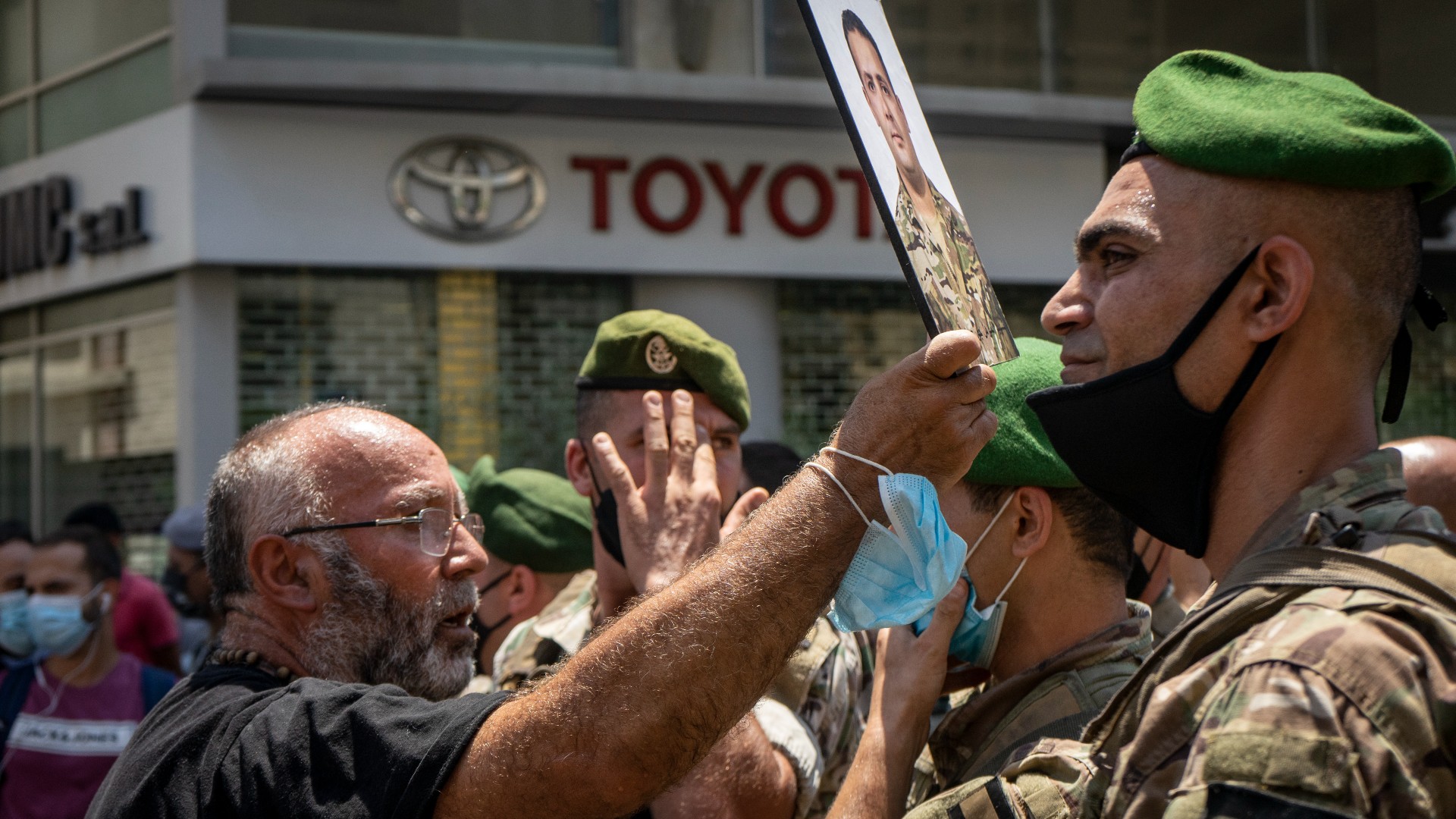'It's time for answers': Victims of Beirut port blast file complaint in US court

It's been nearly two years since Sarah Copland's life was changed forever.
On that fateful day, Sarah was sitting with her then two-year-old son, Isaac, as he was eating dinner. A few hundred metres away, at the port of Beirut, a stockpile of ammonium nitrate ignited and later detonated.
The sheer force of the Beirut blast sent a heavily pregnant Sarah flying across her living room, her body riddled with glass that had shattered from their windows.
"A loud sonic boom sounded a split-second later," she remembers.
'I believe it was corruption that killed my son. It's time now for answers'
- Sarah Copland
Shocked and shaken, Sarah looked up to see that Isaac had been struck, a shard of flying glass had hit him in his chest. Despite rushing Isaac to a nearby hospital, he would eventually succumb to his wounds. He was one of the youngest victims of the 4 August Beirut port blast.
Stay informed with MEE's newsletters
Sign up to get the latest alerts, insights and analysis, starting with Turkey Unpacked
On Monday, Sarah, along with eight US citizens, filed a case in Texas, against the American-Norwegian geophysical services group called TGS ASA.
TGS ASA is the proprietor of Spectrum - a British firm that chartered the Rhosus, the vessel that brought the 2,750 tonnes of ammonium nitrate to the port of Beirut in November 2013.
It was a stockpile of highly explosive material that would never leave the port. When much of it detonated on 4 August 2020, the blast decimated swathes of the city, leaving over 220 dead, 7,000 injured and over 300,000 displaced.
Nearly two years later, much of the damage is still visible, as Lebanon's crisis-laden economy has slowed the rebuild and recovery.
Waiting for justice
In the days following the blast, the Lebanese government promised an investigation that would yield results within five days. However, two years on, the domestic investigation has yet to produce any meaningful findings.
Facing numerous legal challenges and hampered by political interference, the efforts led by investigative judge Tarek Bitar have been delayed for several months.
"It was really important that the domestic hearing be given a chance to succeed. But as time passes, it is clear that the authorities in Lebanon will never let that happen," Sarah told Middle East Eye.

For the families and relations of the victims, there is an overwhelming sense of hopelessness. Desperation which has played out over numerous protests, at times has been met with brute force and teargas. There is fear that justice for the lives lost and billions of dollars worth of destruction will never be found.
This prompted Sarah and several US citizens to seek out what they describe as a "new judicial front". The case in the US is among the very first judicial decisions that will answer just some of the questions around the appearance and eventual neglect of the ammonium nitrate in Beirut port.
"This claim will force TGS to disclose Spectrum's communications with various third parties who are all relevant to the investigations in Lebanon," Zena Wakim, a lawyer at the Swiss foundation Accountability Now, which is supporting Lebanese civil society seeking justice, told MEE.
The plaintiffs accuse the company of being responsible for "negligence resulting in the death" of their loved ones and are seeking approximately $250m worth of damages.
Following the announcement of the filing of the case on Wednesday, TGS "denied any allegations raised" and told an AFP journalist that "a comprehensive investigation was conducted, which confirmed that Spectrum acted diligently in its conduct of the survey and had no responsibility for the explosion. We are confident that we will prevail in this matter".
Spectrum and the Lebanese government
As well as asking questions of Spectrum, the case also seeks answers to the specific contractual relations between Spectrum and the Lebanese government, in particular the Ministry of Energy and its minister at the time, Gebran Bassil.
Bassil is an incredibly powerful and influential figure in Lebanon. The son-in-law of Lebanese President Michel Aoun, he is also the leader of the largest Christian parliamentary party, the Free Patriotic Movement (FPM), allied with Hezbollah - a political group and militia that the US designated a terrorist organisation in 1997.
The case alleges Spectrum had signed four contracts with the Lebanese energy ministry between 2000-2012 to survey seismic activity in Lebanese waters. It was the last of these contracts, signed in 2012 by Bassil, which led to the Spectrum chartering the Rhosus - the task being to transport seismic survey equipment from Lebanon.
The case also argues that Spectrum knew the vessel did not have the capacity to carry any seismic machinery, was not equipped with the right ramps to load or offload such machinery and that it had a "checkered history of maintenance and regulatory compliance". It also alleges that Spectrum knew that the Rhosus was overloaded with the 2,750 tonnes of ammonium nitrate.
"Indeed, rather than seismic equipment being onloaded, the ammonium nitrate would be offloaded," said Wakim.
The ammonium nitrate, originally bound for Mozambique, was unloaded in Beirut at the height of the Syrian civil war. It is unclear whether this was always the intended destination of the fertiliser.
In addition, the case questions the legality and financial accountability of the agreements between Spectrum and the Lebanese authorities.
Using information from Logi, an independent NGO promoting the transparent management of Lebanon's oil and gas resources, the accumulated revenues from these contracts, worth approximately $175m, had been deposited in a bank account run by the energy minister himself and the director of the oil installations of Lebanon under their sole signature.
According to the NGO, these amounts do not appear anywhere, neither in the accounts of the Lebanese state, nor in those of Spectrum.
"Much of the money being generated from these contracts with Spectrum was never audited nor transparently accounted for," said Wakim.
'It's time for answers'
The complaint also alleges that the contract between Spectrum and the energy ministry was kept secret and did not abide by international standards applicable in the industry, as well as remaining "silent on monetary terms."
In regards to the ministry’s handling of revenues, a spokesperson for Bassil told MEE that everything was done in accordance with the law.
"The Sovereign Wealth Fund (SWF) needs a law issued by the parliament in order for it to be established. Until the SWF law is ratified by the parliament and to preserve any petroleum activities revenues, the minister of finance back in 2011 approved the request of the minister of energy and water to open a dedicated bank account at the central bank to receive the Lebanese share of the seismic data licensing proceeds from both PGS and Spectrum."
Responding to the allegedly secretive and suspicious nature of the government contracts with Spectrum, the spokesperson said that "contracts with the seismic survey companies are made on a multiclient basis. Before 2010, the split sharing was 80 percent in favour of the companies and 20 percent going to the government.
"In 2010-11, and thanks to the negotiations of minister Bassil, the split was inverted to 80 percent going to the government and 20 percent to the companies, which has generated $48.6m to the Lebanese government."
The significance of this case will not only be determined in the outcome of the damages, whether they are attained or not, but in terms of the evidence disclosed through the trial discovery process.
For victims like Sarah, the uncovering of dealings that resulted in the neglect of the ammonium nitrate will be pivotal in the search for justice for Issac.
"Corruption isn't just about missing money. I believe it was corruption that killed my son. It's time now for answers," said Sarah.
Middle East Eye delivers independent and unrivalled coverage and analysis of the Middle East, North Africa and beyond. To learn more about republishing this content and the associated fees, please fill out this form. More about MEE can be found here.







